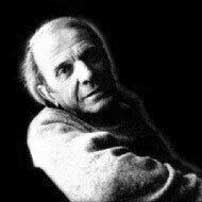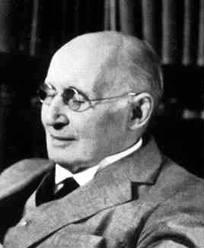Deleuze on Whitehead & Leibniz
As I am reading through a range of Charles Olson’s writing in this, his centenary year, his favorite philosopher, Alfred North Whitehead, of course has been coming to mind again — although I haven’t come across anything new on him as yet in what I have seen of the Centennial occasions. Maybe something will come to light at some point. A couple days ago, Charles Stivale drew my attention to a lecture by Gilles Deleuze (part of his Leibniz series) which he had just translated, a lecture from 10/3/1987 given at Vincennes – St Denis. So here, with Charles Olson and his poetics of process on my mind, is Deleuze praising Whitehead & pulling down Wittgenstein — in three installments:
DELEUZE: L évènement, Whitehead – 10/03/1987
We’re working. The last time, I began a kind of overview or conclusion about the transformation that Leibniz brought about in the notion of substance. If you would allow me to leave that aside, I can come back to it later, especially since it was hardly begun. I feel the need to leave it aside because, as I announced to you, I need help not this time about mathematics, but about certain problems of physics. And since Isabelle Stengers is here today, and won’t be here in the coming weeks, I need to benefit from her presence, and this for two reasons: these problems concern Leibniz very closely and she knows him, and also because these problems equally concern the author who I’ve mentioned since the start of the year I wanted to discuss, specifically Whitehead. So you can consider that our meeting today is fully situated into our research on Leibniz, but also bears on Whitehead and his relations with Leibniz.
You know, the Greeks had a great word, in the neo-Platonic school; there was a leader of the school, and he succeeded the preceding leader, and he had a word to designate the chief successor, it was “the diadoque”. The diadoque. If we imagine the Leibnizian school, Whitehead is the great diadoque, but at the same time, he renews everything. Hence my need – and why I so need to speak about this author whose dates are relatively old, 1861-1947, he died at in old-age. This [need] is because he belongs to these authors, to these very great philosophers who have been smothered, as if assassinated. What does that mean, assassinated?
It means that on occasion, schools of thought arise that establish – in some ways, as regards the problem of thinkers, there are two dangers: there are all the Stalins, the Hitlers that you want, before whom thinkers have only two choices: resistance or exile. But sometimes, inside of thought, there is something else that happens, which are strange doctrines that arise, that get established, that take on a veritable power there where power resides in this domain, that is in universities, and that establish a kind of tribunal, an intellectual tribunal of a special kind, and behind them, or under them, nothing more can grow.
You really should turn off the recording devices because I am speaking quite freely. I will never write what I am saying, so I would like to be able to say: “I never said that”. In this sense, I am accusing British analytic philosophy of having destroyed everything in what was rich within thought, and I accuse Wittgenstein of having assassinated Whitehead, of having reduced Russell, his master, to a kind of essayist no longer daring to discuss logic. All of that was awful and is still going on. France was spared this, but we have our analytic philosophers; yet France was spared because it went through trials that were much worse. Well, this is just to say that everything is going badly. Nothing in the domain of thought dies a natural death, really. This British and American thought, before the war [WW II] was extraordinarily rich, full of richness, with authors that people now have gotten used to treating as if they were rather retarded [debile], like William James. William James was an astounding genius. He was in philosophy exactly what his brother was for the novel. For anyone looking for a doctoral thesis topic, I yet again tremble that there has never to my knowledge been a serious study of the two James brothers and their relations.
And then there is Whitehead, and there was another, an Australian, the only very, very great Australian philosopher, Alexander. Whitehead is read by a handful of admirers and another handful of specialists. After all, Bergson as well… We cannot say that all of that was very serious. In 1903, Whitehead was in training as a mathematician, and with Russell he wrote the Principiae mathematicae, which are at the base of modern formalism and modern logic. These Principiae mathematicae that Wittgenstein will engender [perhaps Deleuze means Whitehead here] constitute a common, dramatic process. Ok, it matters little, I think Whitehead is British, but I get that wrong each time, and then afterward he settled in America around 1920-23 [actually at Harvard starting in 1924]. So the Principiae mathematicae with Russell was a great book of logic. The Concept of Nature, not translated into French, in 1920; Science and the Modern World, one of the rare books by Whitehead translated into French, very beautiful, very, very beautiful, very important, 1926 [actually, 1925], probably unfindable. His great book from 1929, Process and Reality; 1933, Adventures of Ideas. My goal is dual here: I want you to feel the grandeur of this thinking in itself, and at the same time that you grasp the link with Leibniz’s thinking, and henceforth, how literally Whitehead risks bringing to us a fundamental enlightenment about Leibniz. There is no problem with Whitehead’s knowledge of Leibniz. He is impregnated by Leibniz, and like Leibniz, he was a mathematician, a philosopher, and a physicist. Given that every philosophy tried to put something into question, what does Whitehead put into question? He puts into question the problem of what is called the categorial scheme. The categorial scheme is what? He tells us, generally, that the categorial scheme of classical thought is: subject-attribute, substance-attribute. And it is less a question of substance, which you can understand one way or another.
What is important is not to ask if things are substances. The real question is that of the attribute, but in what sense? Precisely must substance be thought as function of an attribute, or must it be thought as function of something else? In other word, is substance is the subject of a predicate, or of predicates, of multiple predicates, is the predicate reducible to an attribute, an attribute like “the sky is blue”? You will tell me that it’s not a fundamentally new problem, but it’s new in a particular way, the cry of Whitehead. The cry that reverberates in all his work: no, the predicate is irreducible to any attribute. And why? Because the predicate is event. The fundamental notion is going to be that of event. And I think that it’s for the third time in the history of philosophy that this cry reverberates, and without doubt, each time it did so in a different way: Everything is event. You will tell me, no, everything is not event since the event is the predicate. For the moment, let’s say: everything is event since the subject is an adventure that only arises from the event. Is there a subject whose birth is not event? Everything is event. I am going to try to say it quickly. The first time, that reverberated with the Stoics, and they were opposed to Aristotle precisely in the Aristotelian enterprise of defining substance by the attribute. And they (the Stoics) maintained what must be called a “mannerism” since to the notion of attribute they opposed the manner of being. Being how, how to be. The attribute is what the thing is, but the how of the thing, the manner of being, that is something else entirely. And the Stoics created the first great theory of the event. And without doubt, there was a filiation [suite] in the logics of the Middle ages; one can locate the continuation of Stoic traditions, but one had to wait a very long time for this cry, this kind of cry to reverberate anew: everything is event!
That is what I have tried to show from the start, namely it’s Leibniz, and there is no worse misunderstanding… I say that the result of our earlier research is that there is no worse error about Leibniz than to understand the inclusion of the predicate in the subject as if the predicate were an attribute. And far from the predicate being an attribute, Leibniz continually denies that the predicate is an attribute; for him, the predicate is a relation, or as he says it precisely in the Metaphysical Discourse: Event, predicate or event, “or”, it cannot be stated better, as he said it in the Metaphysical Discourse. So it seems to me particularly stupid to wonder how Leibniz can take into account once he has placed the predicate in the subject. Not only does he take relations into account, he has no difficulty taking relations into account for the simple reason that, for him, what he calls predicate is the relation, it’s the event. We already began to see a bit how he took account of the relation, but we are leaving that aside. We can well expect that this causes him no problems, a theory of relations. It is only a problem from the perspective of a false Leibniz for whom the reader would believe that the predicate, for Leibniz, is an attribute. In that case, one could ask, in fact, how can a relation be included in the subject. But if what is included in the subject are events, and by definition, as he says it very well, events are relations with existence. And there, we have to take seriously the word relation. Everything is event, at least all predicates are events. And there, for the third time, the cry reverberates with Whitehead: Everything is event.
[to be continued]



 “Todesguge/Deathfugue”
“Todesguge/Deathfugue” “Interglacial Narrows (Poems 1915-2021)”
“Interglacial Narrows (Poems 1915-2021)” “Always the Many, Never the One: Conversations In-between, with Florent Toniello”
“Always the Many, Never the One: Conversations In-between, with Florent Toniello” “Conversations in the Pyrenees”
“Conversations in the Pyrenees” “A Voice Full of Cities: The Collected Essays of Robert Kelly.” Edited by Pierre Joris & Peter Cockelbergh
“A Voice Full of Cities: The Collected Essays of Robert Kelly.” Edited by Pierre Joris & Peter Cockelbergh “An American Suite” (Poems) —Inpatient Press
“An American Suite” (Poems) —Inpatient Press “Arabia (not so) Deserta” : Essays on Maghrebi & Mashreqi Writing & Culture
“Arabia (not so) Deserta” : Essays on Maghrebi & Mashreqi Writing & Culture “Barzakh” (Poems 2000-2012)
“Barzakh” (Poems 2000-2012) “Fox-trails, -tales & -trots”
“Fox-trails, -tales & -trots” “The Agony of I.B.” — A play. Editions PHI & TNL 2016
“The Agony of I.B.” — A play. Editions PHI & TNL 2016 “The Book of U / Le livre des cormorans”
“The Book of U / Le livre des cormorans” “Memory Rose Into Threshold Speech: The Collected Earlier Poetry of Paul Celan”
“Memory Rose Into Threshold Speech: The Collected Earlier Poetry of Paul Celan” “Paul Celan, Microliths They Are, Little Stones”
“Paul Celan, Microliths They Are, Little Stones” “Paul Celan: Breathturn into Timestead-The Collected Later Poetry.” Translated & with commentary by Pierre Joris. Farrar, Straus & Giroux
“Paul Celan: Breathturn into Timestead-The Collected Later Poetry.” Translated & with commentary by Pierre Joris. Farrar, Straus & Giroux
1 Response
[…] Deleuze on Whitehead & Leibniz […]